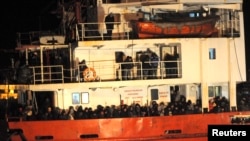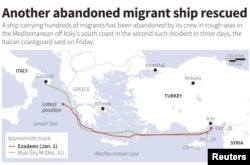The arrival on Italian shores of two crewless ships filled with more than 1,000 refugees – mostly Syrians – has put the spotlight on Turkey's role in people smuggling. With at least one of the ships believed to have used Turkey as a base for picking up their human cargo, the EU has demanded action by Ankara.
At the back of a café in the run down Dolapdere district of Istanbul, home to many migrants seeking to get to Europe, sits a “connection man.” In the jargon of human smuggling, this person brings together migrants and smugglers.
Michael, who did not want to give his real name, is from West Africa. He said he came to Istanbul like many migrants from Africa with the idea of getting to Europe. Instead he found he could make a good living staying put. Michael said Istanbul is one of the main hubs for organizing human smuggling by boat.
"Usually it's one voyage per three months,” he said. “By ship, by boat, this number can be up to 600 people. It's a big business. There is a lot of money, so that's why there are new people now involved in this way. To my knowledge I have almost 10 or 12 contacts doing this business."
Bosphorus becomes favored route
Experts say, until recently, the land route from Istanbul to nearby Greece and Bulgaria was the most popular and cheapest route for migrants. But the increasing success of the EU backed Frontex security force created to patrol its borders has resulted in smugglers rethinking their strategy, according to migration expert Ahmet Icduygu of Istanbul’s Koc University.
Icduygu said the Bosphorus, an international waterway running straight through the heart of Istanbul, offers a unique challenge to authorities and provides an opportunity for smugglers.
"Once the security forces give importance to one region and get tough measures then the smugglers, traffickers or migrants themselves develop their own strategies to overcome these problems and they move from one region to another,” he said. “On the Bosphorus, it's very unique because of this Montreux Treaty.
“Actually in this kind of international waters, there are some limitations to intervene these boats by the Turkish authorities. All the boats report what they are carrying, since its international waters. If there is no proof of any kind smuggling or guns or drugs [Turkish authorities] can't intervene."
Along Istanbul’s seafront, moored just a few hundred meters offshore, there are scores of ships, many ancient rust buckets, one journey short of a visit to the breakers yard. Experts say it’s not uncommon for visiting ships from around the world to change owners, crews and captains and even ship names and then move on with often mysterious cargo.
EU wants answers
But the arrival on Italian shores of two ships carrying migrants prompted Brussels to demand an explanation from Ankara.
“Given what has happened in recent days with the two ships, we wanted to clarify things with the Turkish authorities,” said Natasha Bertaud, a European Commission spokesperson. “It's always the same area the cargo ships are leaving from, so there is a problem that has to be resolved.”
But with Turkey’s bid to join the EU all but frozen due to opposition from some member states, Ankara may not be so forthcoming in cooperation.
"What is important now for all Turkish bureaucracy is dealing with migration issues, is dealing with Syrian refugees,” Icduygu said.
And with Turkey hosting nearly 2 million Syrian refugees and Brussels ignoring pleas to do more to share the refugee burden, Ankara shows little sign of being receptive to the EU’s concerns over the growing numbers of illegal migrants.





